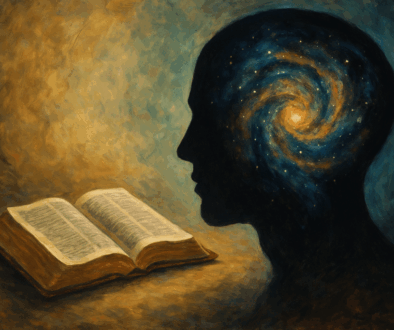The Lost Art of Rest: Restoring the Soul in a Distracted World
“This decision comes clearly from the inside, from the single fact I want to stay sat in a leather armchair, drinking latte, away from things that suffocate the part of me that I should listen to more often” – Old Journal Entry
“I’m tired.” How often do we say these words, without truly understanding what they mean? Our modern world offers countless ways to “relax”: binge-watching Netflix, scrolling through social media feeds, having another glass of wine. They promise quick relief—but do they actually restore us?
More often than not, these passive escapes leave our souls untouched, our minds still buzzing with restlessness, and our hearts longing for something deeper.
“We work to have leisure, on which happiness depends.”
—Aristotle, Nicomachean Ethics
We might ask ourselves: Why do we gravitate toward these distractions?
Can we rediscover a form of relaxation that truly nurtures the soul instead of draining it?
The truth is, genuine rest—the kind that refreshes us from the inside out—is not about numbing ourselves. It’s about intentional stillness, soulful reflection, and opening ourselves to the presence of God. Purposeful relaxation, rooted in practices like prayer, meditation, journaling, and mindful solitude, can reconnect us with our truest selves and with our Creator. In a world addicted to instant amusement, reclaiming this deeper rest is nothing short of an art form we must revive.
The Illusion of Modern Relaxation
Modern culture equates relaxation with consumption. Feeling stressed after work? Grab your phone and lose yourself in countless memes. Need a break on the weekend? Just stream a TV series until your eyes blur. These activities promise a break from reality—but they’re just band-aids on a wound that still festers beneath the surface.
If we’re honest, these quick fixes often leave us feeling emptier, not fuller. Instead of facing our emotions, we’re hiding in endless distractions. The soul yearns for meaningful rest, not just mindless entertainment.
Worldwide Wisdom on True Rest
We’re not the first to seek authentic rest. The desire to pause, reflect, and nourish the inner life has echoed through history:
- Aristotle saw leisure (scholē) as the foundation of a meaningful life. Not mere inactivity, but devoted time for contemplation, learning, and moral growth.
- Thich Nhat Hanh, a modern mindfulness teacher, reminds us that when we are fully present, even simple acts—like breathing or washing dishes—become sacred. His gentle instruction suggests that relaxation isn’t about switching off our brains but turning our attention fully to the moment.
- Simone Weil, a Christian philosopher, considered attention itself a sacred act. In her view, distraction disconnects us from truth and divinity. True rest, then, involves directing our attention inward, where God’s whisper can be heard in silence.
These voices span different eras and cultures, yet they converge on one truth: authentic rest is active, intentional, and grounded in presence. It’s about engaging with life more deeply, not tuning it out.
The Psychology of Distraction
Why do we fall for shallow escapes? Our brains are wired for novelty and instant gratification. Social media platforms and streaming services know this all too well, cleverly designed to keep us hooked. Dopamine, the neurotransmitter of reward, spikes with every new meme or episode we consume.
But this cycle of quick dopamine hits exhausts us mentally. Multitasking, constant connectivity, and endless scrolling leave little energy for reflection or creativity. We might think we’re relaxing, but we’re actually perpetuating mental fatigue.
Psychologists point out that passive consumption is often a form of avoidance coping. Instead of acknowledging discomfort—like anxiety, loneliness, or existential questions—we numb ourselves. This strategy backfires, as unresolved feelings simmer beneath the surface, fueling further restlessness.
The Neuroscience of Rest and Reflection
Neuroscientists reveal that true rest—quiet reflection, prayer, or meditation—engages the brain’s Default Mode Network (DMN). This network, active during introspection and meaning-making, plays a vital role in helping us process memories, connect with our inner selves, and form a sense of purpose. However, the DMN also has a shadow side: when unmodulated, it can push us into overproductivity, perfectionism, and endless rumination. It’s often the culprit behind the relentless mental chatter that leaves us feeling disconnected and restless.
Here’s the paradox: when we overwork or overstimulate ourselves with distractions, we don’t silence the DMN—we overstress it. The result? We swing between hyper-productivity and numbing disconnection, losing touch with what truly nourishes our souls.
Real rest doesn’t just activate the DMN—it modulates it. These practices guide the DMN away from anxious loops and toward a state of calm introspection, where it can facilitate emotional healing, creativity, and a sense of contentment. Over time, this modulation changes the brain’s structure through neuroplasticity, wiring it for deeper resilience and happiness rather than pure productivity.
Interestingly, these practices also improve heart rate variability (HRV), a marker of stress resilience, aligning the body and brain in a harmonious state. By integrating soulful rest into our routines, we create a powerful feedback loop: our brain learns to settle into a balanced rhythm, cultivating clarity and well-being, while our body reinforces this calm with physiological ease.
True rest doesn’t disconnect us from ourselves; it reconnects us, transforming the DMN from a taskmaster of overachievement into a quiet companion guiding us toward joy, meaning, and wholeness.
Biblical Foundations for Soulful Rest – The Sabbath as Freedom
The Bible is not silent about rest.
The Sabbath reappears as a commandment in Exodus 20:8-11, during Israel’s journey from slavery to freedom. For a people who had known only ceaseless labor under Pharaoh, the Sabbath was revolutionary. It proclaimed that their worth was not tied to production. God declared:
“Remember the Sabbath day by keeping it holy. Six days you shall labor and do all your work, but the seventh day is a sabbath to the Lord your God. On it you shall not do any work…”
—Exodus 20:8-10 (NIV)
This command wasn’t just about rest; it was about freedom. It was God’s way of teaching His people that they were no longer slaves to work, but beloved children with inherent dignity and worth. The Sabbath became a countercultural act of resistance against the idol of productivity.
“Drink your tea slowly and reverently, as if it is the axis on which the whole earth revolves—slowly, evenly, without rushing toward the future.”
—Thich Nhat Hanh, Peace Is Every Step
While the Sabbath is traditionally observed as a single day, its principles extend beyond a weekly practice. It’s a mindset, a heart posture that reminds us to prioritize rest, reflection, and relationship throughout our lives.
The Sabbath teaches us that rest is not an indulgence but a necessity. It is God’s gift to us, a holy pause that reorients our lives around what truly matters. By keeping the principles of the Sabbath, we step into the fullness of life God intends for us—one where our souls are restored, our burdens lifted, and our connection to the Divine deepened.
Practical Pathways to Purposeful Relaxation
How do we shift from shallow consumption to soul-deep restoration? It’s simpler than we think:
- Prayer and Meditation:
Instead of reaching for your phone when you feel stressed, try closing your eyes and praying. Speak honestly to God about your worries. Or simply sit in silence, focusing on your breath, acknowledging your feelings, and letting them pass without judgment.
“Do not be anxious about anything, but in every situation, by prayer and petition, with thanksgiving, present your requests to God.”
—Philippians 4:6 (NIV)
When we pray with intention, we align ourselves with God’s peace—something no binge-watched series can replicate.
- Journaling:
Writing down your thoughts helps untangle emotions. It transforms abstract fears into concrete words, making them easier to understand and address. Research has shown that expressive writing improves mental and even physical health.
Consider journaling about a Bible verse that resonates with you. Let Scripture guide your reflections. You’ll find that God’s Word can anchor your inner dialogue, turning journaling into a spiritual exercise.
- Mindful Scripture Reading:
The Bible can become more than a ritual reading. Approach it as soul-nourishment. Rather than skimming through a chapter, pause on a few verses. Let them sink into your heart. Reflect on what they reveal about God’s character and your own journey.
This isn’t about obligation or “checking a box.” It’s about tasting truth and letting it transform your perspective.
- Mindful Solitude:
Disconnect from digital noise for a set time each day. Find a quiet spot, close your eyes, and breathe. Acknowledge thoughts as they come and go. Let the quiet wash over you.
This may feel uncomfortable initially—without distractions, we face our fears and desires head-on. But this vulnerability leads to genuine restoration. In that stillness, God’s voice often becomes clearer, offering guidance and comfort we miss amid constant chatter.
- Embrace the Body’s Wisdom:
Our bodies hold tension and stress. Gentle stretches, a short walk, or a few moments of body-awareness can restore balance. Paying attention to your body in prayerful awareness can make even physical relaxation a spiritual encounter.
Overcoming the Barriers
Transitioning to purposeful rest isn’t always easy. The world tempts us with quick fixes, and our own minds resist change. We may feel guilty for resting or fear missing out on fleeting pleasures. Recognize these barriers, and choose to push through them with grace.
“In solitude, we are least alone, for we come closer to the presence of God, whose voice speaks softly in the stillness.”
—Simone Weil, Waiting for God
Remind yourself: We are human beings, not human doings. We’re not machines built to produce constantly; we need rest to remember who we are—beloved children of God, not defined by achievements or failures.
A Word on Grace
As you try these practices, don’t expect instant transformation. We’ve been conditioned to crave quick results and instant gratification. True rest—like any meaningful skill—requires patience and practice.
If you find your mind wandering during prayer or feel restless without your phone, that’s normal. Observe it without judgment. Offer yourself grace and keep showing up.
We have a God who’s patient, who understands our struggles, who meets us where we are, and gently leads us toward wholeness.
Conclusion: An Invitation to Soulful Restoration
We stand at a crossroads: continue numbing ourselves with empty distractions, or step into a more meaningful approach to rest—one that involves our hearts, minds, and souls in active partnership with the Divine.
It’s still a work in progress for me. I still get lost scrolling from time to time. I still find days I just can’t relax. But I’ve realised it’s something I need to fight for.
“You I advise not to work, but to fight. You I advise not to peace, but to victory. Let your work be a fight, let your peace be a victory!” – Frederique Neitzsche, Thus Spoke Zarathustra
Choosing purposeful relaxation is a countercultural act. It’s an act of faith and courage, acknowledging we need more than superficial entertainment to thrive. We need moments of quiet, vulnerability, and reflection. We need the kind of rest that deepens our understanding, heals our wounds, and draws us closer to God’s presence.
Accept the invitation. Put down the remote, silence the phone, open your Bible, take a breath, and listen. There, in the quiet spaces we’ve long neglected, the lost art of rest awaits to restore our souls.
Psycheverse: “Come to me, all you who are weary and burdened, and I will give you rest.”
—Matthew 11:28 (NIV)




